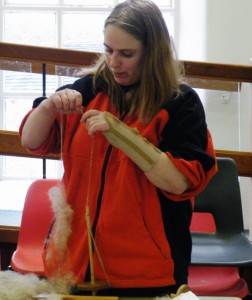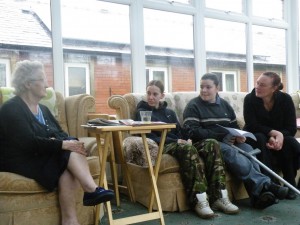New film threads together Burnley’s social history
Article published: Wednesday, February 22nd 2012
Weave a Future, a new documentary celebrating Burnley’s cotton heritage and put together by young people of the former mill town and community media company REELmcr, will premiere next Sunday at the Burnley Mechanics.
 Exploring the history of the town’s lost mass textiles industry, the documentary follows young people from Burnley as they interview ageing former mill workers and explore Lancashire’s past role in cotton manufacture, world trade and Empire and its lingering impact on their lives today.
Exploring the history of the town’s lost mass textiles industry, the documentary follows young people from Burnley as they interview ageing former mill workers and explore Lancashire’s past role in cotton manufacture, world trade and Empire and its lingering impact on their lives today.
Accompanying the documentary will be an extended visual poem, Weave a Future: hope and peace, written, produced and performed by the filmmakers in collaboration with Manchester poet Tony Walsh. Set against haunting images of desolate moorland and ghostly machinery, the poem revives the memories of Lancashire’s former industrial heartland and its legacy for the communities of Burnley.
REELmcr creative director Jacqui Carroll explained to MULE how “when we began people didn’t have a lot of positive things to say” about the town, and “felt hard done by” given the poverty and unemployment in the area. Carroll said the process of making the film had made them “proud” at learning of the global changes wrought by the industrialisation first seen in the area.
Melissa Cooke, one of the young people who took part in the film, said “I’ve lived in Burnley all my life and seen the mills but never thought anything of them.” She told reporters how she had been intrigued by the project and “really enjoyed it”, and “even learned that cotton came from a plant and not a sheep – and it wasn’t just me, loads of people think that!”
And Matt Howard, a photographer who also participated in the project, said he had “never believed myself capable” of writing poetry and performing on camera. He added that he had seen “not only the engagement of a group of young people from Burnley” but had “watched them develop an eagerness to learn and I have seen the most shy and timid stand proud and perform on film.”
“A tapestry of West and East”
Commissioned by Lancashire County Council’s cultural services, the film and poem are the culmination of a two-year “Stories of the World” project to mark the 2012 London Olympics and Paralympic games. Up to 20 people took part, with ages ranging between 16 and 23.
People from a range of backgrounds in Burnley took part in the project, which draws on the historic links between Burnley and other regions of the world through the cotton trade and the British Empire. Carroll said uncovering the links had brought together white and Asian people who participated, adding that they “have since become firm friends”.
Carroll also said the loss of the mills, many of which only finally closed down in the 1970s and 1980s, has implications for Burnley’s future. Although niche textile industries still exist in the area she noted how “up in Burnley there’s still mass unemployment” since the closures, with “not enough jobs for people”.
While disavowing that the film could present a romanticised nostalgia for the “dark, Satanic mills” and horrendous exploitation of the Victorian era, Carroll pointed out how the secure jobs provided by mass manufacturing, which only ended within the lifetimes of some of the people who took part in the film, were a very different prospect. Although the closure had left many “never to work again” she claimed there was “still a lot of love for textiles” in Burnley, and hoped that through “recording the re-engagement” of the town’s young people with their past they could “grow into young adults who now have the world at their fingertips.”
Richard Goulding
The premiere of Weave a Future will screen at Burnley Mechanics, Manchester Road, Burnley BB11 1BH on Sunday, February 26 at 6pm
Free tickets are available from Burnley Mechanics box office at 01282 664400 or via REELmcr
Manchester Mule are currently looking for new editors – check out the blog post here for details
Comments
No comments found
The comments are closed.




